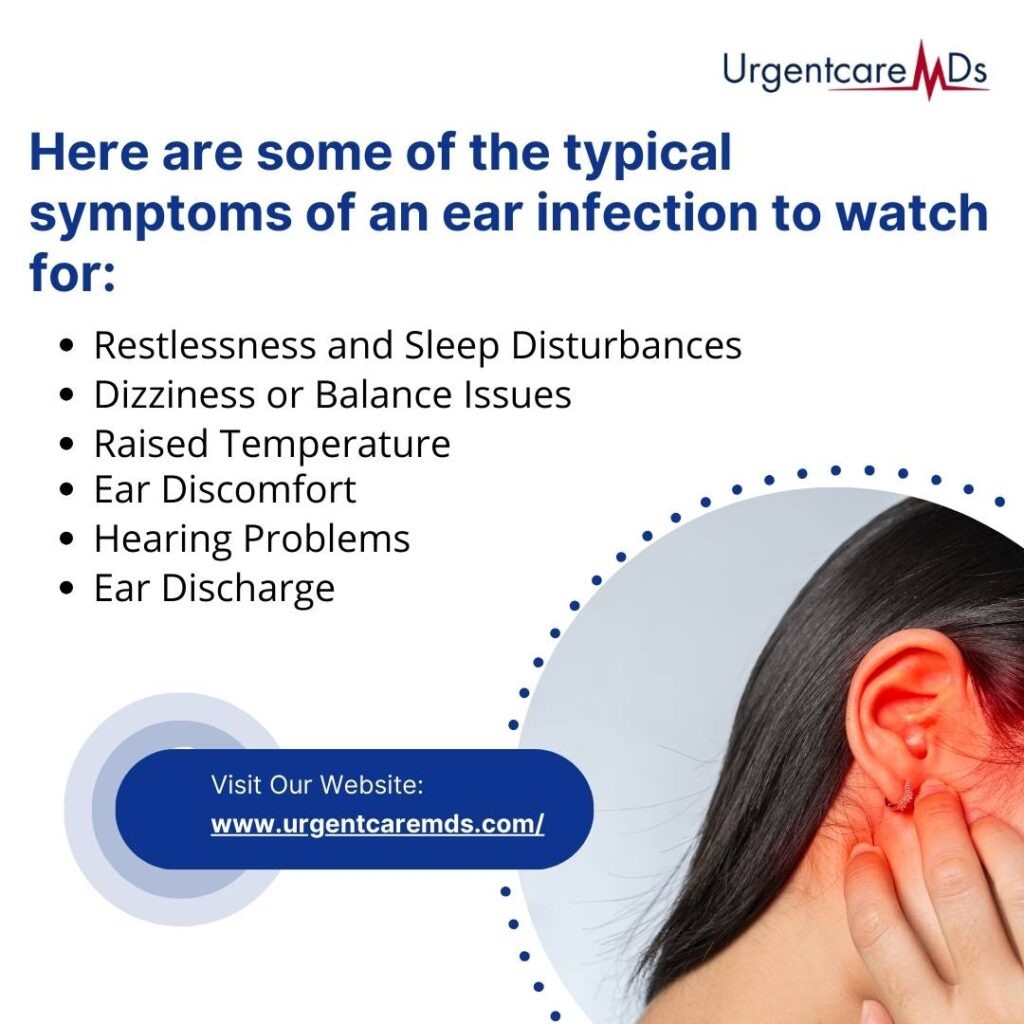Can Ear Infections Cause a Fever?
Ear infections are a common health issue that many people, especially children, face at some point. While ear pain is often the first sign of trouble, you might wonder if an ear infection can cause a fever. In this blog post, we’ll dive into the connection between ear infections and fever, explore common symptoms, and discuss when it’s important to seek urgent care for treatment.

What Are the Common Symptoms of Ear Infections?
Ear infections often come with a variety of symptoms, and knowing them can help you recognize when something is wrong.
- Ear Pain: This is usually the most noticeable symptom. The pain can range from mild discomfort to sharp, severe pain.
- Difficulty Hearing: Ear infections can cause fluid buildup in the ear, which might make sounds seem muffled.
- Irritability and Trouble Sleeping: Children especially may become more irritable and have difficulty sleeping when dealing with ear infections.
- Fluid Drainage: You might notice a yellow, clear, or even bloody fluid coming from the ear.
- Fever: This is another symptom, which we’ll explore more in detail below.
- Balance Issues: Since the ear also helps with balance, an infection might make you feel unsteady.
Recognizing these symptoms early can help you get the right treatment before the infection worsens.
Can Ear Infections Cause a Fever?
Yes, ear infections can cause a fever. A fever is your body’s natural response to infection, and it helps to fight off bacteria or viruses. The higher temperature helps the immune system work more effectively, but it also signals that your body is under stress from the infection.
- Mild Fever: A low-grade fever is common in ear infections and is usually nothing to worry about. It’s part of how your body defends itself.
- High Fever: If the fever is high (above 102°F or 39°C), it could indicate that the infection is more severe or that the infection has spread to other parts of the body.
When Is Fever a Sign of a Serious Ear Infection?
While a mild fever often accompanies an ear infection, there are times when it can be a sign of a more serious condition. So, how can you tell when a fever should raise concern?
- Persistent High Fever: If the fever lasts more than a couple of days or continues to climb, it may be a sign that the ear infection is getting worse or spreading.
- Severe Ear Pain: If the pain in the ear becomes unbearable alongside a high fever, it might indicate a more severe infection that needs medical attention.
- Symptoms of Infection Spreading: If you or your child start to experience other symptoms, such as severe headaches, swelling around the ear, or difficulty moving parts of the face, these could be signs of a more serious infection, like mastoiditis (an infection of the bone behind the ear).
- Multiple Ear Infections: If you have frequent ear infections paired with fever, it’s important to seek further evaluation from a healthcare provider.
These are clear signs that you should seek help from a healthcare provider, such as an urgent care clinic.

How Can Urgent Care Help Diagnose and Treat Ear Infections?
If you suspect you or your child has an ear infection, urgent care centers are a great option for fast diagnosis and treatment. But how exactly do they help?
- Quick Diagnosis: At an urgent care center, a healthcare provider will use a tool called an otoscope to look inside the ear. This helps them check for fluid buildup, redness, or swelling that could indicate an infection.
- Treatment Options: Depending on the type of infection, your healthcare provider may prescribe antibiotics if the infection is bacterial. If it’s viral, they might suggest pain management methods and advice on how to care for the infection at home.
- Preventing Complications: If left untreated, ear infections can lead to complications like hearing loss or the spread of infection to other parts of the head. Urgent care professionals can guide you on the next steps if the infection is severe or recurring.
Urgent care offers convenience and quick treatment, ensuring that ear infections don’t turn into something more serious.
Should I Go to Urgent Care for Ear Infections?
If the symptoms are mild and the fever is low, it’s sometimes okay to manage the infection at home with rest, hydration, and over-the-counter pain relievers. However, there are certain situations where urgent care is the best option.
- High Fever and Severe Pain: If the fever is high or the pain is severe, it’s important to see a healthcare provider.
- No Improvement in Symptoms: If symptoms persist after a few days, it’s time to visit urgent care.
- For Children: Since children are more prone to complications from ear infections, it’s usually a good idea to seek medical help early.
Urgent care centers are equipped to handle ear infections quickly, helping prevent further health issues down the line.
How Can I Prevent Ear Infections?
Preventing ear infections, especially in children, can sometimes be tricky, but there are a few steps you can take:
- Keep Ears Dry: After swimming or bathing, make sure ears are thoroughly dried to prevent moisture buildup.
- Practice Good Hygiene: Frequent hand washing can reduce the risk of infections spreading.
- Avoid Smoke Exposure: Smoke can irritate the lining of the ear, making infections more likely.
- Stay Up to Date on Vaccinations: Vaccinations like the flu shot can help reduce the chances of getting respiratory infections that can lead to ear infections.

Promoting Urgent Care MDs for Ear Infections
If you’re dealing with ear infection symptoms like fever, pain, or hearing issues, Urgent Care MDs are here to help. Whether you’re in Urgent Care Baytown or Urgent Care Crosby, our experienced medical team is ready to provide quick, reliable care for ear infections, including necessary treatments like COVID testing and flu shots.
We also offer services with primary care physicians in Baytown & Crosby, ensuring you receive the ongoing care you need.
Don’t wait for an ear infection to get worse. Visit Urgent Care MDs today and take advantage of our full range of services. From urgent care needs to preventative care, we’re here to help keep your health on track. Get in touch today!
***
The material contained on this site is for informational purposes only and DOES NOT CONSTITUTE THE PROVIDING OF MEDICAL ADVICE, and is not intended to be a substitute for independent professional medical judgment, advice, diagnosis, or treatment. Always seek the advice of your physician or other qualified healthcare provider with any questions or concerns you may have regarding your health.

